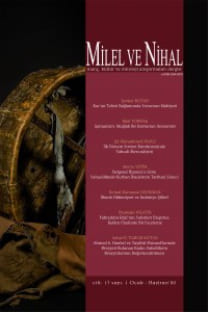İblîs'in Kötülük Problemi'ne Dair Felsefî Argümanları ve Şehristânî'nin “Bilinemezcilik” Teodisesi
Bu makale, ilk olarak eş-Şehrastanî’nin el-Milel ve’n-Nihal eserinde yer verdiği ve insanlar arasında ihtilaf ve şüphelerin neşet etmesinin tek ve asli kaynağı olarak sunulan İblis’in meleklere hitaben dillendirdiği soruları incelemekte ve daha sonra bu soruların kötülük problemi hakkındaki çağdaş tartışmalarda öne çıkan felsefî referanslarının tesbiti açısından bir değerlendirme yapmaktadır. Buna göre, İblis’e atfedilen soruların Tanrı’nın kötülüğü neden var ettiği hususunda kendisini ibra edici bir tarzda sunulduğu ve ayrıca bu sorgulamada çağdaş din felsefesinde yer alan ilgili tartışmalarda yer alan argümanların bulunabileceği ileri sürülmektedir. Ancak buna rağmen eş-Şehrastanî’nin, hem aklî yorumlara hem de muhtemel Kur’anî izahlara yer vermekten kaçınmak suretiyle İblis’in tavrını, ihlaslı bir iman sahibinin girmemesi gereken bir sorgulama olarak sunarak meseleyi basite indirgediği savunulmaktadır.
Anahtar Kelimeler:
Şehristânî, Tanrı ve Kötülük Problemi, İblis, Şüphe
Philosophical Arguments of Iblis Concerning the Problem of Evil and al-Shahrastani's Theodice of Unknown
What this article offers is twofold: in the first place, it examines the interrogation of divine wisdom by İblis concerning the question of the existence of evil in the world as was reported by al-Shahrastanî in his al-Milal wa al-Nihal. In the second, it offers a preliminary assessment of the questions with a view to acsertaining their philosophical reference to the contemporary discussions on the problem of evil. The article is intended to show that İblis poses these questions in such a way as to exonerate himself from being the source of evil. It additionally assertes that in this interrogation one can find arguments that are the same with or similar to the ones advanced in contemporary debates in the philosophy of religion. Also suggested is that al-Shahrastanî nevertheless reduces the whole problem to the mere issue of sincerity of faith in God’s wisdom, avoiding thus having to deal with plausible rational explanations or the Qur’anic doctrines concerning the problem.
Keywords:
Al-Shahrastânî, God and the Problem of Evil, İblis, Doubt.,
- ISSN: 1304-5482
- Yayın Aralığı: Yılda 2 Sayı
- Başlangıç: 2003
- Yayıncı: Milel ve Nihal: Eğitim, Kültür ve Düşünce Platformu Derneği
Sayıdaki Diğer Makaleler
Struggling with the Philosopher, A Refutation of Avicenna's Metaphysics
İblîs'in Kötülük Problemi'ne Dair Felsefî Argümanları ve Şehristânî'nin “Bilinemezcilik” Teodisesi
A Guide to the Phenomenology of Religion
Şehristânî'nin Felsefeye ve Filozoflara Bakışı: Felsefe Tarihinden Felsefî Hesaplaşmaya
Tanrı'nın Asi Çocukları: Zalimlik ve Mazlumluk Arasında Şiddet Sarmalındaki Yahudiler
Şehristanî'nin El-Milel ve'n Nihal Adlı Eserinde Dinler Tarihine Dair Kullandığı Metodlar
Zorunlu Varlığın Bilgisi ve Tümel ve Tikel ile İlişkisi
The Mystery of the Historical Jesus
Abdülkerim eş-Şehristânî'nin İslam Mezheplerini Tasnif Metodu
